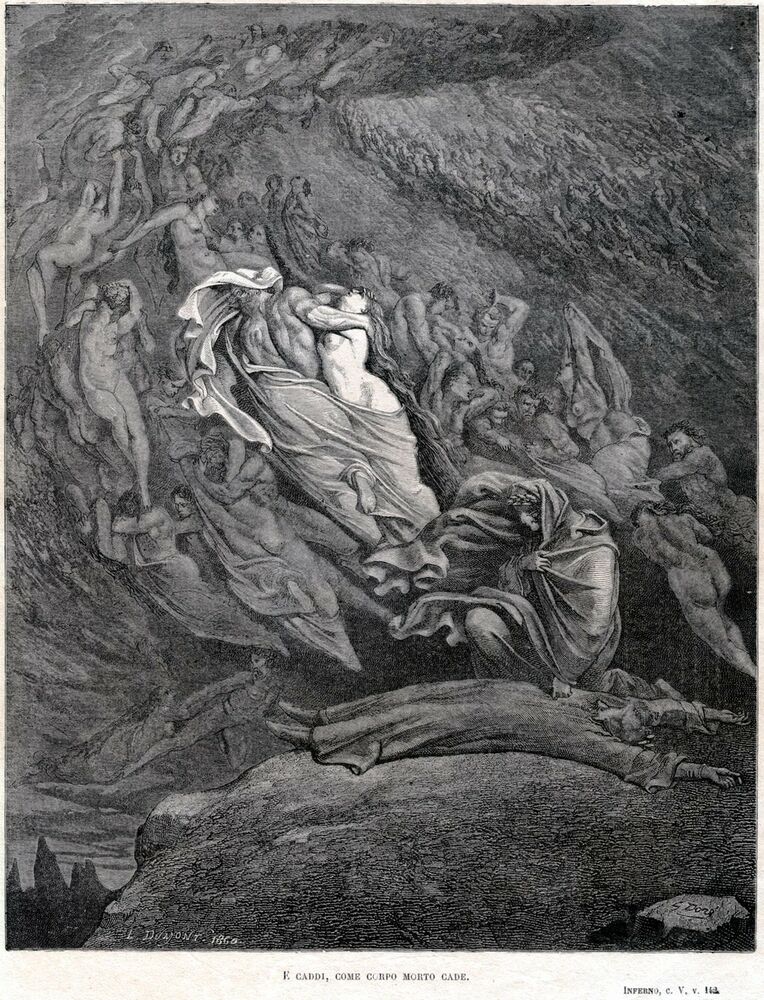The Divine Comedy is the name a poem written in the early fourteenth century by Dante Alighieri. It follows Dante through his journey and discoveries as he makes his way to Paradiso also known as Heaven. As we dissected and analyzed Inferno it was evident the importance of the women characters, the way women were portrayed/illustrated as well as the role they played in helping Dante make his way through Inferno and Purgatorio and in his discoveries.
The first woman to be mentioned in Inferno was Beatrice, Dante’s departed lover. She appears in Canto 2 as the person who sent Virgil to help guide Dante through Hell. She is mentioned through Virgil’s point of view once met with Dante. Alighieri wrote Beatrice to be a beautiful woman ‘true praise of god’(Canto 2: 103) whose eyes are ‘shinning brighter than the morning star’ (Canto 2: 55-56) and whose faith will save her from the evil and the dangers that hide in hell. Her love for Dante caused her worry to grow as he was in search of the mountain that leads to Heaven causing her to leave heaven and go to hell to get Virgil to guide Dante. ”A friend, not of my fortune but myself, On the wide desert in his road has met Hindrance so great, that he through fear has turn’d. How much I dread lest he past help have stray’d, And I be ris’n too late for his relief, From what in heaven of him I heard. And may, I fear, already be so lost, That I too late have risen to his succour, From that which I have heard of him in Heaven.”(Canto 2: 61-66) Her overwhelming worry for Dante was far beyond her care for her own well-being. Her love for Dante allowed him to pass the beasts he encountered and acts as a shield of armor as he makes his way through hell.
Once he makes it into the second circle of hell he encounters Francesca. Francesca was a woman whose lust over her brother-in-law caused her to be sent to hell and one of the rulers of Ravenna. She was married to Gianciotto, the man who killed her for committing adultery with his brother Paolo. In the Canto, she expressed her belief that she was compelled by her love for Paolo for she couldn’t control her urges. She was described to be ‘as a beautiful, gentle seductress’ so much so that ‘even the poet temporarily succumbs to her enchanting words.’(Stuber,2018) Alighieri focus’ the sin of lust to be more about the misconception that love controls and deprives a person of free will causing them to commit such sins rather than the actual act itself. Dante, more explicitly than other moralists and theologians, illustrates that the line between love and lust is quite thin though Francesca’s story. Alighieri allows Francesca to have more lines than all the other characters in the Canto and in those lines she describes her story on how she was sent to hell and her views on love and its power to submit someone to their sexual urges.
Alighieri made it a priority to include women in his writing and illustrate their roles whatever the size may be with the utmost respect and importance. When it came to Francesca he allowed her to go on and have the most lines that helped with the way lust and love were described and how they differed in the Cantos. As well as making them have roles that helped Dante’s journey to Heaven like Beatrice’s stance in sending Virgil to assist and aid Dante on his expedition.
Barolini, Teodolinda, et al., What’s Love Got to Do with It? Love and Free Will. Digital Dante, from
https://digitaldante.columbia.edu/dante/divine-comedy/inferno/inferno-5/
Unknown, Circle 2, canto 5, The University of Texas at Austin, from http://danteworlds.laits.utexas.edu/circle2.html
Unknown, Side by Side Translations of Dante’s Inferno -Canto 2, from
http://danteworlds.laits.utexas.edu/textpopup/inf0501.html
Smith, Catherine, Dante’s Inferno Beatrice Quotes, from https://study.com/academy/lesson/dantes-inferno-beatrice-quotes.html
Unknown, Side by Side Translations of Dante’s Inferno -Canto 5, from https://www.danteinferno.info/translations/canto5.html
Stuber, S. (2018, June 4). Reading Dante as a feminist. The Stanford Daily. Retrieved September 25, 2021, from https://www.stanforddaily.com/2018/06/04/reading-dante-as-a-feminist/.




